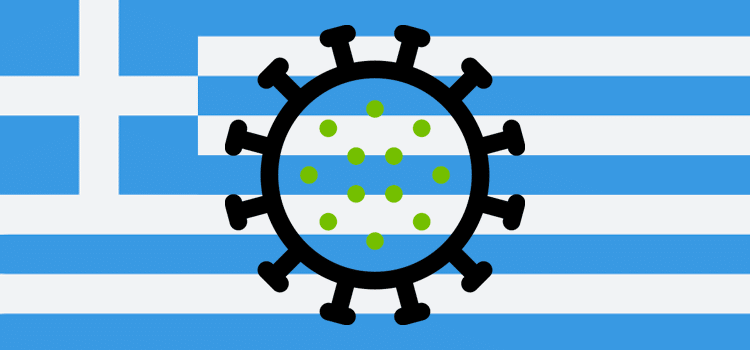To check the real time evolutions concerning international mobility all over of the world, discover the GoWork – COVID-19 Digital Card.
Update: December 15th, 2020
All travelers will be required to self-isolate after entry
What is the change?
Greece will soon require anyone entering the country to quarantine for three days upon arrival.
This change is one of a number steps Greece is taking to mitigate the spread of COVID-19. Greece’s COVID-19 immigration and entry policies are summarized as follows:
- Nationals of European Union countries, the United Kingdom and individuals with a Greek or EU residence permit are permitted entry.
- Most third-country nationals are barred entry. Citizens and permanent residents of Australia, Japan, New Zealand, Rwanda, Singapore, South Korea, Thailand, the United Arab Emirates or Uruguay are excepted from this restriction and are allowed to enter Greece. Nationals of other third countries can be granted entry with a special permit issued from a Greek consulate for essential reasons (mostly employment- or family-related).
- Commercial flights from the Catalonia region in Spain and from Turkey are suspended until at least Dec. 14, and possibly longer. All travelers are required to present negative COVID-19 test results for entry until at least Dec. 14. In addition, all travelers must complete the online PLF form.
- Beginning Dec. 18 until at least Jan. 7, 2021, anyone entering Greece will be required to quarantine (self-isolate) for three days upon arrival. This measure will apply to all travelers entering Greece; there are no exceptions.
Since Nov. 6, Greece has been under a national lockdown due to rising cases of COVID-19. More information about the internal lockdown at forma.gov.gr.
The three-day quarantine will make traveling to Greece for work or business more difficult. Employers should ensure that workers meet all entry requirements and that they comply with internal movement restrictions.
—
Update: November 11th, 2020
All travelers will be required to present negative coronavirus test for entry
What is the change?
The Greek government has announced anyone arriving from a foreign country and seeking entry will be required to have a negative PCR COVID-19 test as of Nov. 11.
Key Points:
- All travelers, except children under the age of 10, entering Greece through land and air will need to present a negative molecular test result performed within 72 hours of their entry.
- The results should be in English and include the name and passport/national ID number of the traveler.
- The testing requirement also applies to Greek citizens, permanent residents and essential and professional travelers.
- Anyone without negative test results will not be granted entry into Greece. • In addition, all travelers must complete an online PLF form. Travelers may still be tested again at Greek borders.
Since Nov. 6, Greece has been under a national lockdown because of rising cases of COVID-19. More information about the internal lockdown at forma.gov.gr.
Employers should ensure that workers are up to date on entry requirement, as well as internal movement restrictions.
—
Update: October 22th, 2020
Updated entry requirements, including flight suspensions and limits for Israelis, Russians
What is the change?
The Greek government continues to update entry requirements related to COVID-19. The requirements change according to fluctuations in infections in individual regions or countries.
Key Points:
- All European Union nationals, United Kingdom nationals, residents and foreign nationals with Greek residency can continue to enter the country.
- Most travelers from all other countries are banned with the exception of nationals of Australia, Canada, Georgia, Japan, New Zealand, Rwanda, South Korea, Thailand, Tunisia, Uruguay and the United Arab Emirates. Foreign nationals from other countries may seek an entry exemption for essential reasons, such as employment or family.
- Until Oct. 25, flights from Turkey and Catalonia in Spain are suspended.
- Travelers from Albania, Belgium, Bulgaria, the Czech Republic, Hungary, Israel, Malta, North Macedonia, Poland, Romania, Russia, Spain and the United Arabic Emirates must have a negative PCR COVID-19 test performed up to 72 hours before their entry.
- Only 10,000 travelers from Israel a week will be allowed entry into Greece. Only 500 travelers from Russia will be allowed per week. Additionally, residents of Russia must arrive at the airports in Athens, Heraclion (Crete) or Thessaloniki.
- All travelers must fill out an online health form 24 hours prior to their arrival.
Entry guidelines in Greece are under review and will be updated every two weeks.
—
Update: March 30th, 2020
Entry restrictions implemented, immigration services suspended
What is the change?
Greece has imposed entry restrictions and suspended immigration services in a bid to slow the spread of the COVID-19 virus.
Key Points
- Greece has suspended entry to non-EU/EFTA visitors. Non-EU/EFTA spouses and minor children of EU nationals are exempted from the entry suspension. Additionally emergency exemptions may be available in limited circumstances, i.e. medical staff, employment or family emergencies. Greece’s entry ban is consistent with the EU’s move to halt travel to the Schengen Area for 30 days.
- Greece’s land borders with Albania, North Macedonia and Turkey remain closed at this time.
- Immigration authorities have suspended in-person appointments until Apr. 10. Residence permits that expire during this time will automatically be extended, according to the announcement of the Greek Ministry of Migration.
